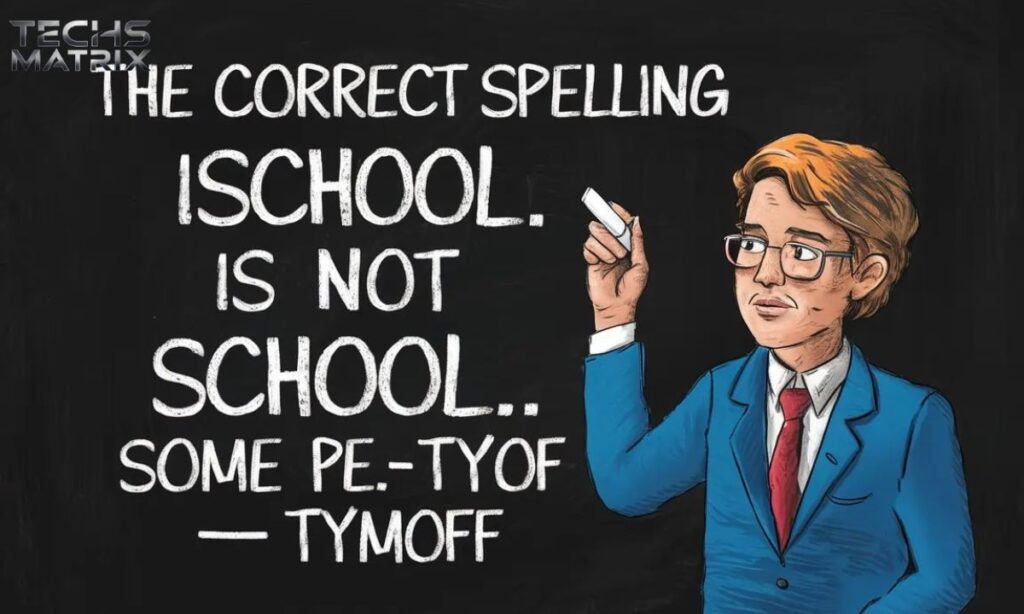Mistakes highlights the significance of proper spelling in everyday communication. Mistakes like writing “scool” instead of “school” can confuse readers and undermine the writer’s credibility. This guide uses humor and engaging strategies to help individuals recognize and correct common spelling errors, making learning enjoyable.
In today’s digital age, tools like spell checkers are essential for improving spelling accuracy. However, relying solely on technology isn’t enough; active practice and awareness are crucial. By focusing on spelling skills, individuals can enhance their writing and ensure clear communication.
What Does “The Correct Spelling Is School Not School. Some Pe – Tymoff” Mean?
The phrase “The correct spelling is school not school. Some pe – tymoff” serves as a humorous reminder. It highlights how a simple mistake can lead to confusion. This phrase emphasizes the importance of paying attention to detail in our writing.
When we misspell “school” as “scool,” it can confuse readers. Such errors can change the meaning of sentences. Understanding the significance of spelling ensures clearer communication. A simple reminder like this can help improve our writing skills.
Ultimately, this phrase encourages us to double-check our work. Spelling is essential for conveying messages accurately. With practice, we can avoid these small but impactful mistakes in our writing.
Why Spelling “School” Correctly Is Important: The Basics?
Spelling “school” correctly is vital for effective communication. Misspelling can lead to misunderstandings and misinterpretations. Clear writing is essential in both academic and professional settings.
When we spell words correctly, it reflects our attention to detail. It shows that we care about our message and our audience. This is particularly important in schoolwork and formal writing.
The correct spelling is school, not scool. This clarity helps maintain credibility in our writing. By practicing spelling, we enhance our overall communication skills and ensure that our ideas are understood.
Common Mistakes Like “Scool”: How to Avoid Them
One of the most frequent mistakes is writing “scool” instead of “school.” This often happens due to the tricky sounds in the word. To avoid this common pitfall, practice saying the word aloud.
Another effective strategy is to take your time while writing. Rushing often leads to careless errors. Slowing down allows us to focus on spelling each word correctly and thoughtfully.
Using spell checkers can also help catch mistakes. These tools highlight errors and suggest corrections. By combining careful writing with technology, we can minimize spelling errors and improve our writing quality.
The Correct Spelling Is School Not School. Some Pe – Tymoff: How Technology Can Help You

In today’s digital age, technology plays a vital role in spelling. Tools such as spell checkers quickly identify errors in our writing. They often automatically correct “scool” to “school” without any effort on our part.
However, it’s important not to rely solely on technology. Sometimes, spell checkers can miss errors, leading to confusion. Proofreading our work after using these tools is essential for ensuring accuracy.
By using technology wisely, we can enhance our writing skills. Learning to spell correctly strengthens our language abilities. The correct spelling is school, not scool, and technology can support us in this important endeavor.
Read This Blog: Pacers vs Milwaukee Bucks Match Player Stats Analysis
Fun Ways to Remember the Correct Spelling of School
Remembering how to spell “school” can be enjoyable. One fun method is to break the word down into smaller parts. You can think of it as “S-C-H-ool,” which simplifies the process and makes it easier to remember.
Another engaging technique is to practice writing the word repeatedly. The more we write it, the more familiar it becomes. Incorporating spelling games can also make learning enjoyable and less tedious.
Saying the word out loud while spelling it reinforces memory. Hearing the letters helps us remember their order. Fun and interactive methods make spelling easier and more enjoyable for everyone involved.
The Correct Spelling Is School Not School. Some Pe – Tymoff: Why It Matters in Schoolwork
In an academic environment, correct spelling is crucial. Teachers often evaluate spelling in assignments and tests. Misspelling “school” as “scool” can negatively impact grades and overall performance.
Clear spelling ensures that our ideas are communicated effectively. It reduces distractions from the content of our work. Paying attention to detail in spelling reflects our commitment to quality and excellence.
Regular practice in spelling builds confidence. As we improve, we can tackle more challenging words with ease. The correct spelling is school, not scool, and it significantly matters in our educational journey.
Why “School” Is Often Misspelled: A Look at Common Errors?
“School” is commonly misspelled due to its unique sounds. The “ch” in “school” can confuse many writers. This often leads to the incorrect spelling of “scool,” which is a common error.
To overcome this challenge, practice is essential. Saying the word slowly while writing reinforces memory. Consistent exposure to the correct spelling will help reduce errors over time and improve overall spelling skills.
Using flashcards or spelling apps can also aid in learning. These tools allow for self-quizzing on difficult words. Regular practice helps solidify the correct spelling in our minds and enhances our language skills.
The Correct Spelling Is School Not School. Some Pe – Tymoff: Top Tips for Avoiding Spelling Mistakes
To avoid spelling mistakes like “scool,” take your time when writing. Rushing often leads to careless errors and misunderstandings. Slow down to focus on each individual word and its spelling for clarity.
Consulting a dictionary can be an effective strategy. If you’re uncertain about a word, looking it up is beneficial. This habit builds a foundation for checking our work and ensuring accuracy.
Lastly, regular practice is key to improvement. The more we engage with words, the more proficient we become. With patience and diligence, we can master spelling common words and phrases effectively.
How Teachers Help Students with the Correct Spelling of “School”?

Teachers play a vital role in teaching correct spelling. They emphasize the importance of spelling in their lessons. The correct spelling is school, not scool, and educators help reinforce this concept through various teaching methods.
Spelling tests and quizzes are common tools in classrooms. These assessments encourage students to focus on spelling accuracy. Engaging activities like spelling bees make learning enjoyable and interactive.
Teachers provide feedback on written work to help students improve. This feedback allows students to recognize and correct their errors. With guidance, students learn to value correct spelling in their writing and overall communication.
The Correct Spelling Is School Not School. Some Pe – Tymoff: Practice Makes Perfect!
Practice truly makes perfect when it comes to spelling. The more we engage with words, the more proficient we become in our writing. The correct spelling is school, not scool, and regular practice aids this mastery.
Writing the word repeatedly reinforces memory. Each time we write it, we strengthen our recall of the letters and their order. Reading also plays a significant role in developing spelling skills and enhancing vocabulary.
Quizzing ourselves or with friends adds an element of fun. It turns learning into a game, making it more enjoyable for everyone involved. With consistent effort, we can master spelling over time and improve our overall writing quality.
Read This Blog: TheJavaSea.me Leaks AIO-TLP: Understanding the Impact and Implications
How Reading Books Can Improve Your Spelling Skills?
Reading books is an excellent way to enhance spelling. Exposure to correctly spelled words helps reinforce memory and understanding. The correct spelling is school, not scool, and reading supports this learning process effectively.
When we read, we see words in context. This helps us understand their spelling and usage. Regular reading broadens our vocabulary and improves writing skills, making us better communicators.
Keeping a list of tricky words encountered in reading can help. Practicing these words will lead to better retention and understanding. Reading consistently contributes to overall language development and spelling proficiency.
The Correct Spelling Is School Not School. Some Pe – Tymoff: Using Spell Check and Proofreading Tools
Spell check tools are beneficial for identifying errors in our writing. They can quickly highlight mistakes like “scool” and suggest corrections to improve clarity. The correct spelling is school, not scool, and these tools aid in this process.
However, it’s essential to proofread after using spell checkers. These tools are not foolproof and can miss errors. Taking the time to review our work ensures clarity and accuracy in our writing.
Learning to spell correctly without reliance on technology is important. Developing our spelling skills strengthens our overall language abilities. Combining tools with practice leads to greater proficiency in spelling and writing.
Frequently Asked Questions
What is the main message of the guide?
The guide emphasizes the importance of correct spelling, particularly for the word “school.”
Why is spelling important in communication?
Correct spelling ensures clarity and prevents misunderstandings in written communication.
How can I improve my spelling skills?
Regular practice, reading, and using tools like spell checkers can significantly enhance your spelling.
What common mistake does the guide highlight?
It highlights the frequent misspelling of “school” as “scool.“
Can technology help with spelling mistakes?
Yes, technology, such as spell checkers, can assist in identifying and correcting spelling errors.
Conclusion
Spelling is a crucial aspect of effective writing. The correct spelling is school, not scool, and mastering it enhances communication. Paying attention to spelling reflects our dedication to clarity and understanding in our writing.
Regular practice, reading, and using technology can improve our skills. Engaging with words through fun activities makes learning enjoyable. Ultimately, the more we practice, the more confident we become in our spelling abilities, leading to better communication overall.

Sallas: Tech-savvy professional with 5 years in the industry. Skilled in software development, cloud computing, and AI. Known for innovative solutions and teamwork.








